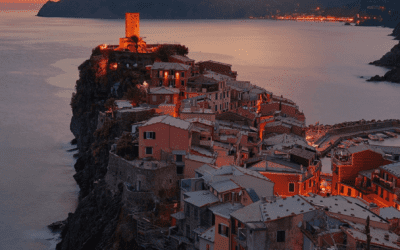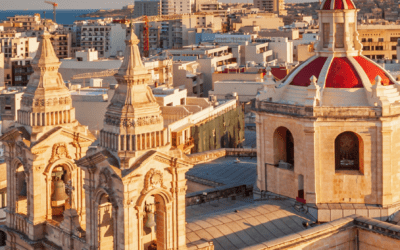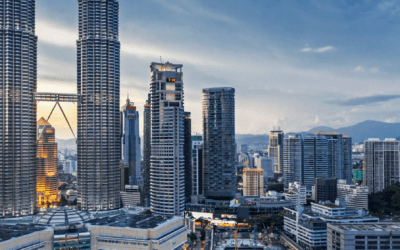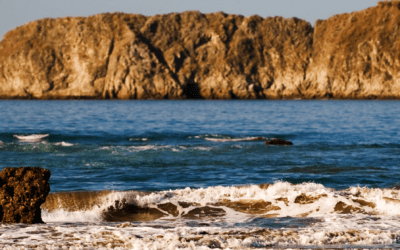Everyone has a place they’re drawn to and every island tells its own story, captivating, filled with echoes of the past and the promise of new chapters still to be written.
Malta is such a place.
This trio of islands in the Mediterranean Sea named Malta, Gozo and Comino is home to mysterious ruins and relics of civilisations that thrived over 8,000 years ago. Its Neolithic temples are the oldest free-standing structures known, even older than Egypt’s pyramids.
There are clear traces too of one of the most pivotal times in Malta’s history, when the Knights of St John – who became the Knights of Malta – ruled the island and founded its capital city, Valetta.
Malta’s more recent history is no less seismic. It joined the European Union in 2003, transforming a beautiful but ancient city into a bustling hub for tourists, investors, and the banking sector.
This isn’t just an island with architectural marvels and historical sites; it’s also celebrated for its wonderful weather, a wide array of leisure activities, a well-established maritime tradition and a welcoming attitude to new arrivals.
Then, there are Malta’s financial opportunities and the significant tax advantages it offers to qualifying individuals.
While citizenship has its perks, for those looking to plant a Maltese flag without full citizenship, various permanent residency routes are available. These include The Global Residence Programme, The Residence Programme, and the Malta Permanent Residence Programme.
We’ve spoken before about the benefits of Malta citizenship by investment and the necessary steps to achieve it. Let’s now explore the benefits and requirements of obtaining permanent residency in Malta.

Why Malta?
With a total population of around 500,000, Malta’s capital city of Valletta is the smallest in the EU, but don’t let that put you off. Malta has a rich culture and offers both political and economic stability. Given its size, Malta’s Gross Domestic Product (GDP) per capita of €33,037 in 2022 compares favourably with the Euro Area’s average of €39,644 and real GDP growth is estimated to have remained strong at 6.1% in 2023. With a strong financial services sector, opening a bank account in Malta is a convenient and reputable option for new residents.
Add to this free universal healthcare, childcare and education for its citizens and the benefits soon start to stack up.
And if that isn’t enough, there is Malta’s natural beauty, pleasant climate, plentiful beaches and lively resort areas.
If you’re looking for a good quality of life, Malta should definitely be at the top of your list.
Malta Residency Programs
Before we explore the various residency programs, there are certain caveats that apply to all of them.
Fit and Proper Person:
While the language used in the application guidelines is vague, being a ‘fit and proper person’ simply means proving you don’t have a criminal record. You can achieve this requirement by submitting an apostilled police conduct certificate. The certificate cannot be issued earlier than six months prior to the date of your application.
You must also submit a sworn declaration taken before a Commissioner of Oaths in Malta affirming that you do not have any ongoing civil or criminal proceedings. The Commissioner can ask further questions until they are satisfied that you have met this requirement.
The Commissioner can consider a number of factors, including whether you’re of good conduct and morals, your reputation and character, any convictions for fraud, disqualification by professional or regulatory bodies, bankruptcy, money laundering, past encounters with the Maltese government and more. Each individual included in your application — dependants and household staff — must make the same sworn declaration.
Healthcare:
In order to qualify for the program, you must also obtain health insurance with a company licensed in Malta or have global health insurance coverage from a reputable company. You must submit a certified copy of the insurance policy with your residency application.
Malta actually has one of the best healthcare systems in Europe, with EU health card holders able to enjoy subsidised healthcare there. If you are not from the EU, you should obtain a private health insurance policy.
Legal Requirements:
An application for special tax status under the Maltese Global Residence Programme may only be submitted through the services of an Authorised Registered Mandatory (ARM).
An ARM is an individual with the legal right to practise as an advocate, legal procurator, notary public, accountant or financial services practitioner in Malta. Your application will not be valid until it is signed and submitted by an ARM.
International Documents:
Any documents you submit with your application that were not issued by Malta must be accompanied by an Apostille Certificate. Furthermore, all documents not in English must have a certified English translation.
No Other Malta Tax Program:
This goes without saying, but you can only be the beneficiary of tax benefits from one Maltese residency program.
Renewal:
If you choose to renew your Malta residency, you will need to provide evidence that you met the conditions for the previous year and will fulfil them for the coming year. This involves submitting your Annual Tax Return showing that you paid the minimum tax of €15,000. You should also provide a declaration that you have not lived outside Malta for more than 183 days.
Submission and Processing:
Your application and all supporting documents will be submitted by your ARM to the International Tax Unit.
Once submitted, your application will be checked and vetted. An acknowledgement letter will be sent to your ARM, and you will be informed of the progress of your application and any missing information or documents until your application is approved.
Now, let’s look at the details of each of Malta’s residence programs.
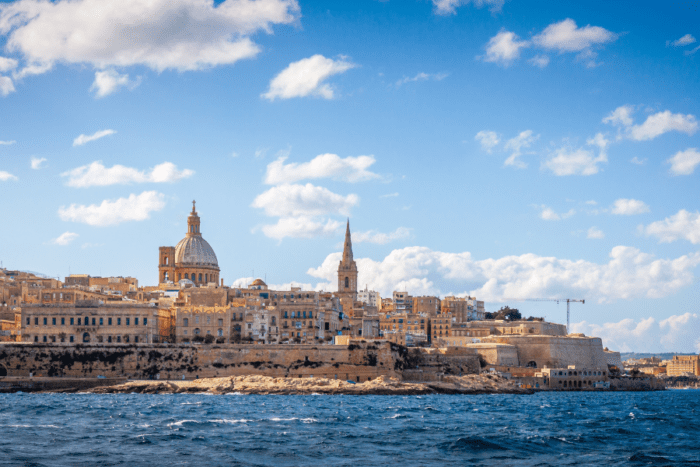
The Malta Global Residence Program
Launched in 2013, the Malta Global Residence Program (GRP) allows non-European Union citizens (including the EEA of countries Iceland, Liechtenstein and Norway) and non-Swiss nationals to live in Malta and enjoy its advantageous tax regime. It also includes their dependants – spouses, children under 26 and parents.
The program is designed to strengthen Malta’s property market, stimulate its legal, tax and financial services industries, as well as boost the leisure and hospitality sectors.
The main criteria for being approved for the Global Residence Programme (GRP) is proving you have the financial means to maintain yourself and your dependants in Malta. As with any immigration program, Malta wants to ensure you can contribute to the economy and not become a liability to the government.
However, Malta understands that to compete for the attention of seven- and eight-figure entrepreneurs and investors, it must offer something in return.
The Global Residence Programme does just that with an attractive tax scheme and visa-free access to the entire Schengen area.
Malta’s Residence Requirements
To be eligible for this program, you must own or rent a property in Malta and meet the following requirements:
- Be the resident or national of a country other than countries in the EU/EEA, Iceland, Liechtenstein, Norway or Switzerland
- Maintain stable and regular resources to sustain yourself and any dependants
- Possess valid travel document
- Purchase health insurance that covers yourself and any dependants
- Undergo a fit and proper person assessment
- Be able to communicate in Maltese or English
- Spend less than 183 days outside the country
- Submit the proper documents.
If purchased on the central island of Malta, the property value must be at least €275,000. If purchased in Gozo and the Southern Region of Malta, the minimum property value is €220,000.
However, suppose you purchased a property to qualify for another Malta residency program before June of 2013 and would like to re-qualify for the GRP with the same property. In that case, you will need to prove the home’s value.
If the original purchase price was below the new investment Malta residency requirement, you will need to make a declaration of the home’s current value, supported by a separate and independent architect valuation of your property.
If you choose to rent, you must sign a contract for a property of at least 12 months. The rent must be at least €9,600 a month in Malta or €8,750 a month in Gozo and the Southern Region. The lease agreement should also indicate whether or not the property is furnished and any separate agreements relating to furnishings and value.
It is also important to note that the property you rent or lease cannot be used by anyone other than you, your dependants, or those you employ. In other words, renting your house out on Airbnb for the six months you are gone is not an option, nor is subletting. It is not allowed in any of the locations for any period of time.
Qualifying Family Members
In your residence request, you have the opportunity to include:
- Your spouse
- Any of your children who are under 25 years old
- Anyone that you have employed in the past two years.
Application Steps and Fees
- Submit the application. It is mandatory that the application is signed and submitted to the Commissioner for Revenue by an ARM.
- The administrative fee is €6,000 except where the qualifying owned property is situated in the south of Malta, in which case it reduces to €5,500.
- After that, the Commissioner’s office will review and vet the application accordingly. They will inform the ARM of the progress and outcome.
- Once an application is deemed valid, a due diligence process will be conducted. Again, the ARM will be informed of the outcome.
- If all is successful, a confirmation letter will be issued.
You will also be entitled to a work permit and visa-free access to the EU and Schengen area.
Tax Benefits with Malta Residency
If you qualify, you will be able to live in Malta and enjoy the tax benefits that come with being a resident. The most significant tax benefit is that you will not be taxed on your foreign-sourced income as long as that money is not remitted to Malta. If remitted, it will be taxed at a reasonable 15%. There is also no inheritance tax.
Any foreign-sourced capital gains will not be taxed, even if they are remitted to Malta. However, if you have an annual income arising outside of Malta of at least €35,000, a minimum tax liability of €5,000 (€15,000 for a family) per annum is payable.
Any foreign-sourced capital gains will not be taxed, even if they are remitted to Malta.
You are responsible for managing your tax affairs and should keep supporting documents of all your finances. At the end of each year, you must submit your Annual Tax Return in order to renew your residency and the accompanying special tax status.
The Residence Programme Basics
In contrast, The Residence Programme (TRP) is a tax and residence program for nationals of the EEA, EU, Iceland, Liechtenstein, Norway and Switzerland. This also includes their qualifying dependants Beneficiaries and they may also have household staff providing a service in their qualifying property.
Requirements
To be eligible for this program, you must meet the following criteria:
- Be a national of the EEA, EU, Iceland, Liechtenstein, Norway or Switzerland
- Maintain stable resources to support yourself and your family members
- Purchase health insurance
- Undergo a fit and proper person assessment
- Be able to communicate in Maltese or English
- Spend less than 183 days outside the country
- Submit documents, including:
- a certified copy of the insurance policy
- a police conduct certificate
- any documents that will be submitted for tax residence.
Additionally, you must own or rent a qualifying property as your primary residence. But you won’t be able to let or sublet it – you and your dependants are the only people allowed to reside there.
However, you do not have to own or rent a qualifying property at the time of the application. The certified deed or lease agreement can be submitted later.
Application Steps and Fees
The following are the basic steps and fees involved in the process for TRP:
- Submit the application. It is mandatory that the application is signed and submitted to the Commissioner for Revenue by an ARM.
- Pay the non-refundable application fee of €6,000 or €5,500 If the qualifying property is in the south of Malta. After that, the Commissioner’s office will review and vet the application accordingly. They will inform the ARM of the progress and outcome.
- Once an application is deemed valid, a due diligence process will be conducted.
- If all is successful, a confirmation letter will be issued. However, if you have not yet submitted your deed or lease agreement, you will need to do so in order to receive this letter.
Tax Residence
A person who is granted a special tax status through The Residency Programme (TRP) will be taxed 15% on any foreign-earned income that is remitted to Malta and 35% on any local income. This tax also applies to the tax resident’s dependants.
As highlighted above, there is also a requirement to pay a minimum tax of €5,000 (€15,00 for a family) on any income earned from outside of Malta, even in the year when the tax status is confirmed or cancelled.
However, you may request relief from double taxation once the minimum tax amount is met.
Once you qualify for the special tax status, you must submit an Annual Tax Return.
Permanent Residence
In addition to securing a tax residence, EEA, EU, Iceland, Liechtenstein, Norway and Switzerland nationals have the option of applying for permanent residence through TRP if certain conditions are met.
These include having a permanent residence certificate or having applied for permanent residence through EU citizenship rights.
The Malta Permanent Residence Programme Basics
Launched in April 2021 — and replacing the previous Malta Residence and Visa Programme – the Malta Permanent Residence Program (MPRP) offers options for non-EU nationals and qualifying family members.
The perks include visa-free travel within the Schengen area and the right to reside, settle, and stay indefinitely within Malta. There is no minimum stay requirement with this option.
On an annual basis, your agent will need to submit proof of your property lease, as well as evidence of health insurance coverage. This will be required each year for the first five years and whenever necessary after that.
Malta Residence (MPRP) Requirements
Aside from standard criteria that we have already established, to be eligible for this program, you must:
- Be a national of a non-EU country
- Have a source of wealth and funds
- Be able to demonstrate a minimum capital of €500,000, with €150,000 being in financial assets.
Additionally, you must commit to paying the total non-refundable government contribution and rent or purchase a property in Malta. Depending on if you are purchasing or renting a property, the contribution is €28,000 or €58,000, respectively.
To meet requirements when purchasing a property, the value must be €300,000 or more in the south of Malta and €350,000 for the rest of the island. If renting, the minimum yearly amount must be €10,000 in the south of Malta and €12,000 for the rest of the island. In either case, you must hold the property for at least five years.
A €2,000 donation to a charity or non-governmental organisation (NGO) is also required.
As before, you are also allowed to include family members in your residency request, including financially dependent grandparents.
Applications Steps and Fees
The following are the basic steps and fees involved in the process for MPRP:
- Submit the application. This can be done through a Power of Attorney to entrust the application process to a law firm.
- Pay an initial non-refundable application fee deposit of €10,000
- The Malta Permanent Residence Agency (MPRA) will then review the application and supporting documents and conduct the due diligence test. This usually takes four to six months to complete.
- Once approved, pay the remaining application fee of €30,000
- Rent or purchase property
- Pay the government contribution fee and the charity donation.
If you are also applying for qualifying family members, additional application fees will be due.
After you have gained Malta residency and lived there for five years, you can apply for citizenship. However, you will need to have resided in Malta for a full 12 months immediately before the date of application. Additionally, you will need to have lived in Malta for four of the five years prior to those 12 months.
At this point, you will also need to be able to prove that you have an adequate knowledge of Maltese or English.
How to Get Residence in Malta by Investment
The Pros and Cons of Malta’s Residency Programs
While Malta residency has many benefits through the different Malta residency schemes, there are also a few caveats. Exploring these will help you understand which program is right for you.
The Pros
Visa-free access: Since Malta is part of the EU, you will gain visa-free access to travel throughout EU countries and the Schengen area.
An indefinite stay: Under the MPRP Malta residency scheme, a resident of Malta has the right to stay and settle indefinitely and can even eventually apply for citizenship. Under the GRP and TRP, a Malta resident can gain long-term or permanent residence. Your family members and staff can join you, too.
Tax benefits: The GRP and TRP plans come with a special tax status that allows you to benefit from a flat minimum tax rate, a 15% rate on foreign earned remitted income, and a 35% on local income.
Quality of life: Even though Malta is a small island, it boasts one of the best qualities of life in all of Europe. From its first-class infrastructure, ideal temperatures, sparkling beaches, stable economy and some of the best banks in the world, you really can’t go wrong.
The Cons
Not the cheapest: Malta’s residence programs are expensive and require you to make a sizable investment. Between the cost of renting or purchasing a property and the administrative fees involved, it’s a residence program that requires financial commitment.
Physical presence: While some residence programs only require you to visit the country a couple of times a year, Malta is not one of them. In order to qualify for Malta residency, you must spend at least 183 days there under the TRP.
Stacked programs are out: You can’t combine the tax benefits from different Malta residency programs. You can only choose one program at a time. However, with some programs, you have the option to renounce and apply for another if you qualify.
Malta Residence Program: FAQs
Malta’s residence programs require you to make a sizable investment. For example, the GRP requires a minimum property purchase of €220,000 or €8,750 a month in rent. There is also an administrative fee of around €6,000.
Depending on the program, anyone can apply for residency in Malta, provided they meet the specific requirements, such as having adequate financial resources and making a property investment in Malta.
Yes. Under the GRP and TRP, you must spend 183 days in the country per year. Additionally, you need to rent or purchase a property for a given amount of time.
You must submit your annual tax return to provide evidence that you met the conditions for the previous year and the coming year. You must show that you paid the minimum tax of €15,000 and provide a declaration that you haven’t lived elsewhere for more than 183 days.
You are allowed to apply for citizenship, but it is a lengthy process. Additionally, under the GRP and TRP, you would have to give up your special tax status and pay taxes on your worldwide income instead.
Yes. You have to pay taxes in Malta but there are generous tax incentives on offer to expat residents.
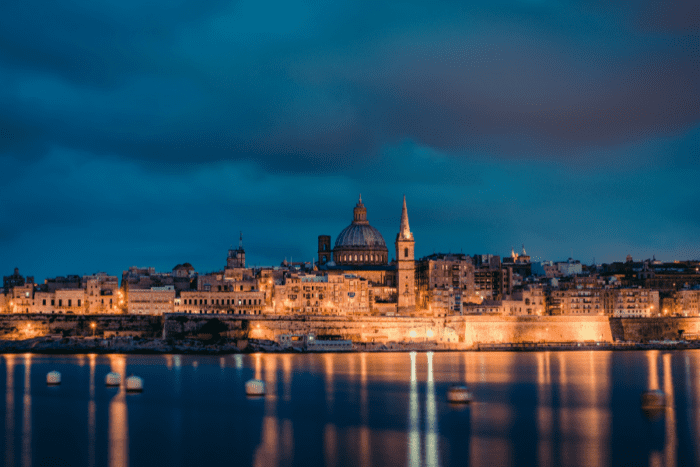
Your Malta Residency
Keep in mind that every residency program has pros and cons, which must be carefully considered in light of your personal plans, goals and preferences.
If you want a program that offers tax incentives while allowing you to live in a stunning Mediterranean location, you should seriously consider Malta.
Just don’t wait too long before making a decision to gain Malta residency. These programs are subject to change, so now is the time to take action.
That’s where Nomad Capitalist comes in. We help seven- and eight-figure entrepreneurs and investors create a bespoke strategy using our uniquely successful methods. We’ll help you keep more money, create new wealth faster, and be protected from whatever happens.
We’ve helped more than 1,500 high-net-worth individuals carefully examine the best residency options, helping them keep their assets safe and legally reduce taxes. Apply to become a client, and we can help you do the same.







